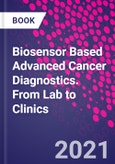Biosensor Based Advanced Cancer Diagnostics helps biomedical engineers, researchers, molecular biologists, oncologists and clinicians with the development of point of care devices for disease diagnostics and prognostics. It also provides information on developing user friendly, sensitive, stable, accurate, low cost and minimally invasive modalities which can be adopted from lab to clinics. This book covers in-depth knowledge of disease biomarkers that can be exploited for designing and development of a range of biosensors. The editors have summarized the potential cancer biomarkers and methodology for their detection, plus transferring the developed system to clinical application by miniaturization and required integration with microfluidic systems.
Please Note: This is an On Demand product, delivery may take up to 11 working days after payment has been received.
Table of Contents
1. Introduction: Background, state-of-art for design and development of biosensor-based techniques strategy2. Types of Biomarkers associated with cancer and other disease associated health risk factors3. Basic concept for Biosensor-based devices4. Type of Biosensors-based on Biorecognition element5. Type of Biosensors-based on transducers6. Multidisciplinary approach to device design7. Fabrication technique of Biosensor-devices 8. Lab-on-chip devices-based type of cancer cell targeting9. Challenges and future prospects and commercial viability of Biosensor-based diagnosis
Authors
Raju Khan Senior Principal Scientist & Professor, CSIR-Advanced Materials & Processes Research Institute, Bhopal, Madhya Pradesh, India.Raju Khan is a Senior Principal Scientist and Professor, at CSIR-Advanced Materials and Processes Research Institute, Bhopal. He did his PhD in Chemistry in 2005 from Jamia Millia Islamia, Central University, New Delhi, and Postdoctoral researcher at the "Sensor Research Laboratory� University of the Western Cape, Cape Town. His current research involved synthesizing novel materials to fabricate electrochemical and fluorescence-based biosensors integrated with microfluidics to detect target disease risk biomarkers for health care monitoring. He has published over 150 papers in SCI journal, which attracted over 5500 citations as per Google Scholar, published 45 book chapters in the reputed book Elsevier and Taylor Francis, editing of 28 books from Elsevier and Taylor Francis, and his research has been highlighted in Nature India. He has supervised 5 PhD and 30 undergraduate/postgraduate theses and has supervised 4 numbers of postdoctoral fellows under the scheme of N-PDF, CSIR-Nehru Fellowship, and DST-Women Scientist Projects.
Arpana Parihar Industrial Waste Utilization, Nano and Biomaterials, CSIR-Advanced, Materials and Processes, Research Institute (AMPRI), Bhopal, Madhya, Pradesh, India. Arpana Parihar is a DST Scientist B at CSIR-Advanced Materials and Processes Research Institute (AMPRI), Bhopal, India. She has 8 years of research and teaching experience and her current research interests include fabrication (Micro/Nano-fabrication) of Bio-devices/bio-medical POCT Devices for early diagnosis of cancer and infectious disease. She has gained significant expertise in the field of 3D cell culture, drug designing, tissue engineering, photodynamic therapy, molecular dynamic simulations, and immunoinformatics. S.K. Sanghi Chief Scientist & Head, Microfluidics & MEMS Centre & Materials for Radiation Shielding and Cement free Concrete CSIR-Advanced Materials and Processes Research Institute (AMPRI), India.. Sunil Kumar Sanghi was working as Chief Scientist, Professor and head at Microfluidics & MEMS Centre, CSIR-Advanced Materials and Processes Research Institute, Bhopal, India. His past research areas were development of manual and automated procedures for all kinds of analytes in biomedical, pharmaceutical and environmental samples using micro liquid, capillary gas chromatographic and capillary electrophoretic separation techniques in combination with sample preparation, derivatization and reaction-detection systems, micro-chip-based separation under the concept of lab-on-a-chip. Dr. Sanghi has successfully completed several International and national collaborative R & D projects viz. Indo- European Union, Indo - French, NMITLI etc. He was awarded the reputed Marie Curie Fellowship of European Union, and worked as a visiting scientist for three years at the University of Amsterdam and Institute Curie, Paris. He holds an experience of 35 years in R&D and teaching. Recently, Dr. Sanghi has received the National Meritorious Innovation Award 2021 from Government of India.







